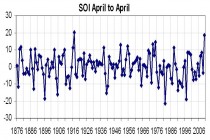By Roger Pielke Jr, Roger Pielke Jr.’s Blog
Writing in the popular meteorology magazine Weatherwise on disasters and climate change, Jeff Masters of the Weather Underground has decided to rewrite what the academic literature says to be more favorable to what he would like it to have said.
Masters (mis)characterizes a 2011 literature review by Laurens Bouwer as follows:
A 2010 paper in the Bulletin of the American Meteorological Society by Netherlands researcher Laurens Bouwer titled, “Have Disaster Losses Increased Due to Anthropogenic Climate Change?”, looked at 22 disaster-loss studies worldwide, published between 2001 and 2010 All of the studies showed an increase in damages from weather-related disasters in recent decades. Fourteen of the 22 studies concluded that there were no trends in damage after correcting for increases in wealth and population, while eight of the studies did find upward trends even after such corrections, implying that climate change could be responsible for the increased disaster losses.
Does Bouwer conclude that eight of those studies actually “[imply] that climate change could be responsible for the increased disaster losses”? Actually, no. Bouwer concludes exactly the opposite to what Masters attributes to his paper.
And here is what Bouwer actually says (here in PDF):
Studies that did find increases after normalization did not fully correct for wealth and population increases, or they identified other sources of exposure increases or vulnerability changes or changing environmental conditions. No study identified changes in extreme weather due to anthropogenic climate change as the main driver for any remaining trend.
Here is what Bouwer concludes on the full set of 22 papers that he reviewed :
The studies show no trends in losses, corrected for changes (increases) in population and capital at risk, that could be attributed to anthropogenic climate change. Therefore, it can be concluded that anthropogenic climate change so far has not had a significant impact on losses from natural disasters.It is of course perfectly acceptable for people to challenge data and analyses on the possible relationship of human-caused climate change and disaster losses, and ideally they will do so in the academic literature. But when existing peer-reviewed studies are fundamentally misrepresented in popular discussions, no one’s interests are served.
Jeff Masters graciously responded to my email invitation to comment with this reply just received by email:
Hi Roger, thanks for the note. As you point out, my discussion of Bouwer’s excellent paper was too short and potentially misleading. When I discuss his paper in the future, I will include the sentence,
“Studies that did find increases after normalization did not fully correct for wealth and population increases, or they identified other sources of exposure increases or vulnerability changes or changing environmental conditions. No study identified changes in extreme weather due to anthropogenic climate change as the main driver for any remaining trend.”
----------------
Oue biggest objections to Master’s 9 page story are his implications that the Fujita scale must be wrong because it doesn’t show an increase in severe (F3-F5) tornadoes and the fact he never mentions La Nina or the PDO/AMO, each of which played a key role in the extremes. In fact it was the second strongest La Nina on record and inspired Icecap contributing author Art Horn to write an article for the Energy Tribune in late 2010 predicting a super La Nina and the classic effects, heavy snow and cold west and north, spring floods, major tornado outbreaks, southern droughts and heat waves and late summer and fall hurricanes with improved landfall chances for the east. Stan Changnon had written an artilce for BAMS discussing the benefits exceeding losses for El Ninos but not La Ninas.





